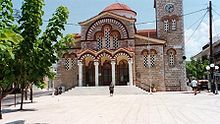- Merbaka
-
Merbaka (Greek: Μέρμπακα), but officially Agia Trias (Αγία Τρίας, "Holy Trinity"), is a village in the province of Argolis, in the Peloponnese near Argos, Greece.
Merbaka is thought to have been named for William of Moerbeke, a 13th-century Roman Catholic archbishop of Corinth, scholar and Philhellene from Flanders. A roughly contemporaneous Byzantine-Gothic Church of the Dormition in the village may have been built under his auspices.[1]
Merbaka's official name likely stems from the inclusion of three "saints" on a re-used Classical pediment on the thirteenth-century church: Villagers likely interpreted these figures as a representation of the Holy Trinity, and unofficially renamed the church to reflect this; in time, the name was applied to the village itself. This older church includes other recycled antiquities like a Roman dedication, in Latin, to Quintus Metellus, a Roman proconsul in Greece who was noted for his suppression of piracy.[2]
The modern church of the Holy Trinity, first erected in 1898, was torn down and rebuilt in 1934.[3] A plaque on the front of the belltower says that the clock was donated 1952.
Merbaka is part of the municipal unit of Midea. According to the 2001 Greek census, the village had a population of 1,267 inhabitants.
Notes
Categories:- Populated places in Argolis
Wikimedia Foundation. 2010.


